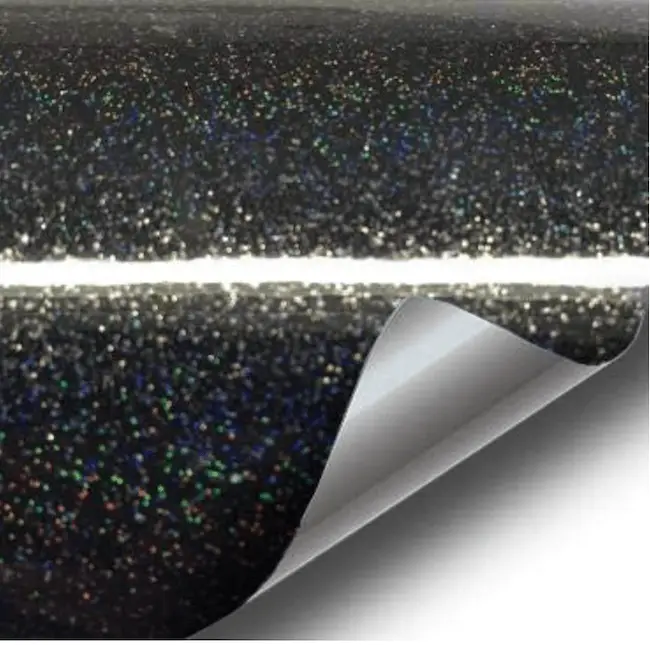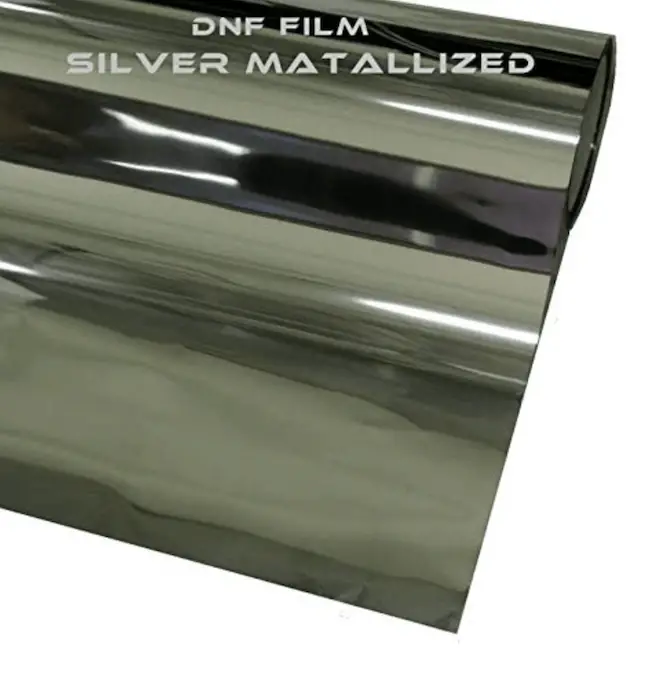Last Updated on January 2, 2024 by Alex Koch
Metallic Window Tint
Metallic window tint is one of a few different types of window tint film options. This includes ceramic, carbon, dyed, and metallic tint.
We are going to cover the pros and cons of metalized window tint.
What metallic window tint is made of and how much does it cost to purchase metalized window tint?
What Is Metallic Window Tint?
Metalized window film is a type of window tint that is made with metallic particles (metal elements).
The metal element can be aluminum or titanium. This gives the window tint film its metallic appearance. It also makes it more durable and scratch-resistant compared to traditional window tint films. Metallic window tints can also help to reflect heat and UV rays. This makes it a popular choice for those who live in hot climates.
Metallic window tint is available in a variety of colors, including black, silver, gold, and bronze. It can also be found in mirrored or non-mirrored styles. Metallic window tint is typically more expensive than traditional window tint.
What are the Benefits of Metalized Window Tint?
Metalized metallic window tint is very popular because it offers many benefits to your vehicle compared to other types of window tints:
The Benefits of Metalized Window Tint Include:
– Increased durability and scratch resistance over traditional films
– More affordable than ceramic or carbon tints
– Can be used on any window or glass surface
– Can be applied to windows with curved surfaces
– Can be used on any vehicle, including cars, trucks, boats, and RVs
– Can be used in residential and commercial applications
– Comes in a wide range of colors and shades
– Offers UV protection for the interior of your vehicle

What are the Drawbacks of Metalized Window Tint?
Metalized window tint has some drawbacks that you should consider before deciding whether or not to use it:
The Drawbacks of Metalized Window Tint Include:
– Not as durable as ceramic or carbon tints
– Not as dark as ceramic or carbon tints
– Cannot be used on windows with a lot of curves
– Cannot be applied over existing window film
– Not as effective at blocking heat as ceramic or carbon tints
– Not as effective at blocking UV rays as ceramic or carbon tints
– May have a slightly metallic appearance to the eye
Is Metallic Metalized Window Tint Legal?
In most cases, yes.
Metallic window tinting is typically legal in the United States as long as it meets certain criteria. The criteria for metallic window tinting vary from state to state but generally, the film must allow a certain percentage of light into the vehicle. Metallic window tinting can also help reduce glare from the sun which can be beneficial for drivers.
How Expensive is Metallic Window Tint?
Typically, metallic window tint is more expensive than traditional window tint (dyed film). However, the benefits may be worth the extra cost for some people. The cost will vary depending on the type of metal used, the color, and the size of the window. It is important to consult with a professional installer to get an accurate estimate.
Metalized Window Tint Cost
The cost of metalized window tint will vary depending on the type of metal used, the color, and the size of your window. Typically, metallic window tint is more expensive than traditional window tint (dyed film). However, the benefits may be worth the extra cost for some people. Metallic window tint can add style and scratch resistance to your vehicle.
How long does metallic tint last?
Metallic window tinting can last for many years if it is properly cared for.
Metallic window tint is typically more durable than traditional window tint films. However, it is not as durable as ceramic or carbon tints and may not be suitable for windows with a lot of curves. It can also be applied over existing window film but should not be used on windows that already have a metallic appearance.
What is the science behind Metallic Tint? (How is metalized window tint made?)
Metallic window tint is made by applying a thin metal coating to a transparent film.
The metal used in metallic window tint can be either aluminum or stainless steel. The metal is applied in a vacuum chamber and then heat is applied to fuse the metal to the film. The end result is a thin, durable, and reflective film that can be used on any window or glass surface. Metallic window tint comes in a wide range of colors and shades to match your vehicle’s style.

How to Apply Metallic Window Tint?
Applying metallic window tint is similar to applying any other type of window film.
First, the surface must be cleaned and dried. Next, the film is cut to size and applied to the window. Once the film is in place, it is smoothed out and trimmed as needed. Finally, a squeegee is used to remove any air bubbles and ensure that the film properly adheres to the window.
If you are not experienced in applying window tint, it is best to consult with a professional installer. Metallic window tints can be more difficult to apply than traditional window tints due to their reflective properties. If not installed correctly, it can cause bubbling or peeling.
How Do I Remove Metallic Window Tint?
Removing metallic window tint is a difficult and time-consuming process.
The adhesive used to attach the film to the window can be very strong and it is often necessary to use a special solvent or razor blade to remove it. If not removed properly, metallic window tint can damage the surface of your windows. It is best to consult with a professional installer if you need to remove metallic window tint from your vehicle.
Metallic Metalized Window Tint And GPS Reception
One of the potential disadvantages of metallic window tints can interfere with electronic signals, so be sure to check with your installer about any concerns in your area before having it installed.
This includes GPS and cell phone reception. If you are considering metallic window tint, be sure to check with your installer to see if there are any concerns in your area.
Metalized Window Tint And Cell Phone Reception
As mentioned above, metallic window tints can interfere with electronic signals. This includes cell phone reception and radio transmission. If you are considering metallic window tint, be sure to check with your local tint shop to see if there are any concerns in your area, especially if these features are important to you.
Metallic Metalized vs Ceramic Window Tint
Both ceramic tint and metallic tint have benefits and drawbacks. Metalized window tint is generally more expensive than ceramic window tinting, but it also has a metallic appearance, is more scratch-resistant, and can reflect heat and UV rays. Ceramic window tints are available in a variety of colors and styles, are less reflective, and can help to filter out UV rays. It is important to consider your needs when choosing between metalized and ceramic window tints.
Metallic Metalized vs Dyed Window Tint
Dyed window tint is the traditional type of window tint. It is less expensive than metallic window tint so you can save some money, but it is also less durable and not as effective at blocking heat or UV rays due to the dye used. Metallic window tint can add style and scratch resistance to your windows while also helping to reflect heat and UV rays. If you live in a hot climate, metallic window tint is the way to go. With dyed window tint, you should consider the amount of solar heat exposure, the fading that will impact the appearance and quality of the film over time, and price.
Metallic Metalized vs Carbon Window Tint
Carbon window tint is another type of window tint that has become popular in recent years. It is less reflective than both metallic and ceramic window tints and can help to filter out UV rays. Metallic window tinting is typically legal in the United States as long as it meets certain criteria, while carbon window tinting may not be legal in all states. It is important to check with your installer to see which type of tint is best for you.
Metallic window tint is a great choice for those who want the benefits of window tinting without the dark, heavy look of ceramic or carbon tints.
Can Metallic Window Tint Be Used In Residential Applications?
Yes! Metallic window tinting can also be used in residential applications such as homes, offices, and schools. It offers UV protection for the interior of your home and comes in
Metalized Window Tint And Driving
Metalized window tints are not recommended if you drive in areas that have a lot of dust and dirt. The metalized window tint can become scratched easily and it is very difficult to remove scratches from this type of window tint. If you drive in areas with a lot of dust and dirt, it is recommended that you use another type of window tint that is easier to clean.
If you’re looking for ways to reduce the sun’s glare while driving or want to add style and protection to your windows Metallic Window Tint may be a good choice for you!

